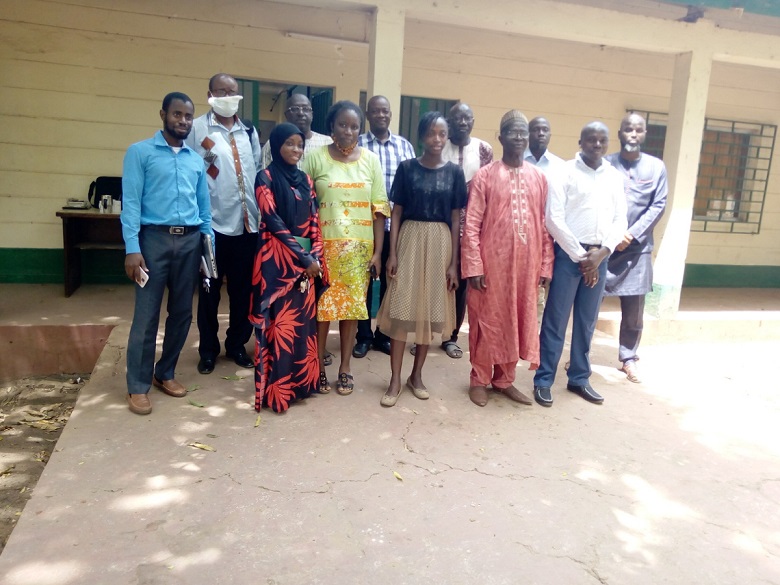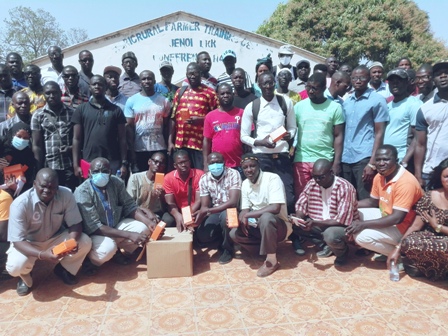
GLMA, FAO and Partners Validate MIS to Enhance Economic Growth
- General
- June 12, 2020
- mansabanko.gm
The Gambia Livestock Marketing Agency (GLMA) and partners on 8 June 2020 validated the newly developed Marketing Information Systems (MIS) and website for GLMA.
The two instruments are aimed at facilitating the collection and dissemination of market prices and agricultural information to help improve the agency’s engagement with stakeholders, in order to enhance productivity.
The Food and Agriculture Organization (FAO) of the United Nations facilitated the development of the website and Market Information System and the conduct of the validation exercise through support from the European Union-funded project titled “Agriculture for Economic Growth and Food Security/Nutrition to mitigate migration flow.
The project aims to contribute to sustainable growth in the agricultural sector and reduce food insecurity and malnutrition, as well as mitigate migration flows to Europe. It is being implemented by FAO and the World Food Programmes and their partner agencies in both the public and private sectors.
In 2019, a Gambian software development company called Forté Innovations Ltd was contracted to develop the systems. The systems are designed to facilitate the collection, storage and timely use by the Ministry of Agriculture for decision making and policy design.
According to GLMA and FAO officials, the availability of good quality market price data plays a fundamental role in enhancing market transparency, competitiveness and the more equitable sharing of benefits between market participants.
Director-General of GLMA, Dr Demba Jallow lauded the significance of the FAO intervention to the operations of his agency. He is positive that the MIS and website would sustainably build and strengthen the resilience of the communities against poverty, and reduce food and nutrition insecurity through access to improved market information and services.
He added that, currently, GLMA is manually collecting field data from livestock markets throughout the country and other terminal markets and therefore making the availability of timely and accurate data will significantly benefit the agency and the country, at large.
Dr Duto Sainey Fofana, Chairman, Board of Directors of GLMA, explained that the MIS plays an important role in agro-industrialisation and food support chain. The system has the potential to bring all value chain actors together on a platform on a real-time basis, he told the validation.
Speaking about the MIS, Mr Ebrima Cham, Deputy Director-General of GLMA, said this intervention was conceived in September 2019, when FAO and GLMA held their first consultative meeting in Abuko to discuss the modalities and tools for the establishment of a new MIS for the agency.
Cham added that FAO hired the services of Forte Innovations Ltd to develop a website and MIS for GLMA that would facilitate real-time data collection and dissemination of livestock market data and information and the real-time basis for stakeholders and the public at large.
Mr Saja Kora, GLMA Focal Person for the MIS Website development, thanked the management of GLMA for their support and contribution towards the development of the MIS and website.
“Every part of the process was interesting, but I have to say the most interesting part was when we went out to the field to test the mobile app widely around the country,” he remarked.
Mrs Rampedi, FAOR Gambia, represented by The FAO Programme Officer, Ms. Louise Tine, said she’s optimistic that the availability of a functional MIS will contribute in reducing the workload of GLMA staff by minimizing manual data collection and entry, enhance delivery and fasten decision making.
She also noted that moving the Gambian agricultural sector into the digital world will have a multiplier benefit as the world moves to a post COVID era. In addition, using this new technology will cut down cost on of paper meaning that as a bonus, it is beneficial for the environment and thus contribute towards the reducing global warming and climate change.
The FAO official told her audience that in The Gambia, 46 % of the labour force works in agriculture whilst 80% of the rural population have agriculture as their primary source of income.
